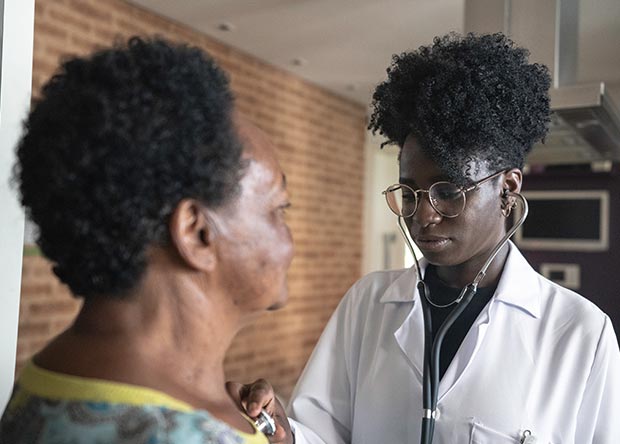In order to take an active role in our own health, we need to be prepared. It’s important to get informed about multiple myeloma (MM) before talking with our doctors and their support team. That way, we can feel confident in speaking up for our health.
Here are some suggestions for making sure that your questions are answered:
Know the Facts:
Know the facts:
Research and read up on MM from trusted sources.
Prepare Ahead of Time:
Prepare ahead of time:
Write down all questions you want to ask and bring them to your next appointment.
Be Ready to Share:
Be ready to share:
Make it your word to show up to your appointment ready, honest, and open. Don’t be afraid to provide details that you may not even think are important—your doctor and care team may need that information to provide you with better care options.

Questions to ask
By asking questions, we are advocating for ourselves. Our MM questions invite conversation, and there’s no better time to get clarity about MM than during our appointments with our doctor and nurses.
To get the most out of each appointment, here are a few questions you can keep in mind:
Testing for MM
- How is MM usually detected?
- Are there further tests needed to confirm my MM diagnosis?
- Are there any risks involved with testing for MM?
- Are these tests covered by my insurance plan?
- How do I prepare for MM testing?
- What should I expect from these tests?
Your test results
- When can I expect my blood test results?
- Will you help explain my results to me?
- If something is unusual, what are my next steps?
- Do I need to bring anyone with me to my appointment?
About your diagnosis
- Where is the multiple myeloma located in my body?
- What stage of MM do I have?
- Do I need treatment now?
- Is it possible to continue living my current lifestyle?
- Do I need to change what I eat?
Treatment
- Has it spread? If yes, how far?
- What are my different treatment options to choose from and why?
- What are the risks and side effects I can expect from treatment?
- If I experience any side effects, what should I do?
- How quickly do we need to decide on treatment?
- Where can I get my medicine?
- How do I take the medicine?
- How will we know if the treatment is working?
- How might treatment affect my daily activities?

Working with your care team
We have a care team at our disposal, and each person plays a valuable role. When dealing with our health, it’s good to know whom we can reach out to and how they can best help us. Here are a few team members who might help you through your health journey:
Primary care provider or general practitioner
Primary care provider or general practitioner
A doctor who sees you for common medical problems and routine exams. If you’re at risk, proactively asking your doctor about MM and bringing up any signs and symptoms you’ve been experiencing may be the first step in figuring out if you require testing.
Hematologist-oncologist
Hematologist-oncologist
A doctor who specializes in treating cancers of the blood. They have extra training in the blood system, bone marrow, and blood cancers. They are best suited to diagnose and treat your MM.
Advanced practice provider, nurse practitioner, or physician assistant
Advanced practice provider, nurse practitioner, or physician assistant
These are healthcare providers who have advanced training and can help you manage your health by providing you with medical services, like conducting physical exams and ordering lab work. They can also help you manage chronic conditions and make referrals to specialists if needed.
Oncology nurse
Oncology nurse
A nurse who works with you if you’re at risk of being diagnosed with cancer. In addition to providing you with necessary tests and helping administer your medicine, they manage your care team to make sure you have a personalized plan.
Nurse navigator
Nurse navigator
A member of your care team who provides resources and information to help you throughout your treatment process.
Don’t forget your care team also includes your doctor’s office staff who can help you with paperwork and verifying insurance coverage, as well as the patient support team available to you from the maker of the medicine you take.
Remember, your care team can also include family, friends, and multiple myeloma advocacy organizations. While an MM diagnosis might be tough to deal with, you are surrounded by many who can help look after your well-being and lift you up.

Questions to ask your doctor and care team
Check out the MM self-advocacy empowerment guide.
